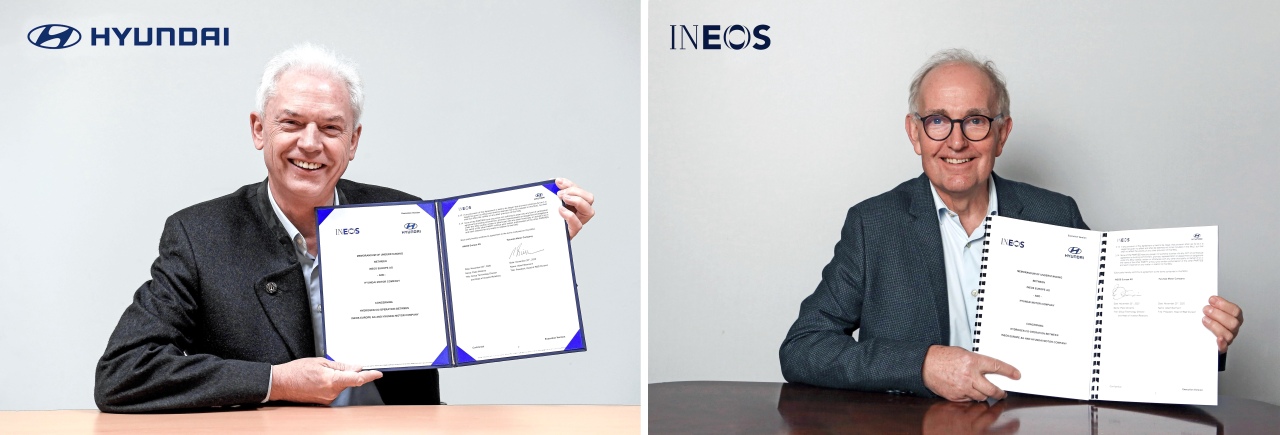Hyundai Motor, Ineos partner to explore hydrogen business opportunities
Hyundai’s fuel cell system to be applied for Ineos’ new SUV ‘Grenadier’
By Shin Ji-hyePublished : Nov. 23, 2020 - 14:02

South Korea’s largest automaker Hyundai Motor and London-based chemicals company Ineos have partnered to explore new business opportunities in the global hydrogen economy, the automaker said Monday.
Earlier on Friday, the two companies signed a memorandum of understanding to jointly investigate opportunities for the production and supply of hydrogen as well as the worldwide deployment of hydrogen applications and technologies.
The two companies plan to introduce a new hydrogen electric vehicle by installing Hyundai’s fuel cell system in the Grenadier sport utility vehicle, which is being developed by Ineos Automotive, a subsidiary of Ineos.
Hyundai Motor’s vehicle fuel cell system was applied to its hydrogen-powered SUV Nexo, which has the longest driving range among hydrogen-powered vehicles in the market.
“Ineos’ move into the development of a fuel cell electric vehicle and hydrogen ecosystem marks yet another milestone toward sustainable and clean transportation,” said Kim Sae-hoon, senior vice president and head of fuel cell center at Hyundai Motor.
“Hyundai believes this will provide an important low-carbon option across a wide range of sectors. We also hope our decades-long expertise in hydrogen fuel cell work in synergy with Ineos’ expertise in field of chemistry to realize the mass production of green hydrogen and fuel cells for the Grenadier.”
The companies will also cooperate in expanding the hydrogen economy in Europe by creating hydrogen-related business opportunities, Hyundai said.
The European Union has recently announced its goal to drastically increase the production of green hydrogen and expand investment in hydrogen-related infrastructure such as storage, distribution, transportation and charging through the establishment of hydropower facilities.
In line with the move in Europe, the two companies formed a consultative body to work closely with EU, European governments and private companies to seek immediate business opportunities.
Based on Ineos’ technology in the chemical sector and Hyundai’s technology in the fuel cell system sector, the two companies plan to actively strive to expand the global hydrogen ecosystem in Europe.
They will initially seek to facilitate public and private sector projects focused on the development of a hydrogen value chain in Europe, Hyundai Motor said.
Hyundai started the world’s first mass production of fuel cell electric vehicles in 2013. In 2018, the automaker announced its mid- to long-term road map, Fuel Cell Vision 2030, to increase annual production of hydrogen fuel cell systems to 700,000 units by 2030.
Ineos recently launched a new business to develop and build clean hydrogen capacity across Europe in support of the drive toward a zero-carbon future. The company currently produces 300,000 metric tons of hydrogen a year, mainly as a by-product from its chemical manufacturing operations.
By Shin Ji-hye(shinjh@heraldcorp.com)
Earlier on Friday, the two companies signed a memorandum of understanding to jointly investigate opportunities for the production and supply of hydrogen as well as the worldwide deployment of hydrogen applications and technologies.
The two companies plan to introduce a new hydrogen electric vehicle by installing Hyundai’s fuel cell system in the Grenadier sport utility vehicle, which is being developed by Ineos Automotive, a subsidiary of Ineos.
Hyundai Motor’s vehicle fuel cell system was applied to its hydrogen-powered SUV Nexo, which has the longest driving range among hydrogen-powered vehicles in the market.
“Ineos’ move into the development of a fuel cell electric vehicle and hydrogen ecosystem marks yet another milestone toward sustainable and clean transportation,” said Kim Sae-hoon, senior vice president and head of fuel cell center at Hyundai Motor.
“Hyundai believes this will provide an important low-carbon option across a wide range of sectors. We also hope our decades-long expertise in hydrogen fuel cell work in synergy with Ineos’ expertise in field of chemistry to realize the mass production of green hydrogen and fuel cells for the Grenadier.”
The companies will also cooperate in expanding the hydrogen economy in Europe by creating hydrogen-related business opportunities, Hyundai said.
The European Union has recently announced its goal to drastically increase the production of green hydrogen and expand investment in hydrogen-related infrastructure such as storage, distribution, transportation and charging through the establishment of hydropower facilities.
In line with the move in Europe, the two companies formed a consultative body to work closely with EU, European governments and private companies to seek immediate business opportunities.
Based on Ineos’ technology in the chemical sector and Hyundai’s technology in the fuel cell system sector, the two companies plan to actively strive to expand the global hydrogen ecosystem in Europe.
They will initially seek to facilitate public and private sector projects focused on the development of a hydrogen value chain in Europe, Hyundai Motor said.
Hyundai started the world’s first mass production of fuel cell electric vehicles in 2013. In 2018, the automaker announced its mid- to long-term road map, Fuel Cell Vision 2030, to increase annual production of hydrogen fuel cell systems to 700,000 units by 2030.
Ineos recently launched a new business to develop and build clean hydrogen capacity across Europe in support of the drive toward a zero-carbon future. The company currently produces 300,000 metric tons of hydrogen a year, mainly as a by-product from its chemical manufacturing operations.
By Shin Ji-hye(shinjh@heraldcorp.com)




















![[Today’s K-pop] BTS pop-up event to come to Seoul](http://res.heraldm.com/phpwas/restmb_idxmake.php?idx=642&simg=/content/image/2024/04/17/20240417050734_0.jpg&u=)